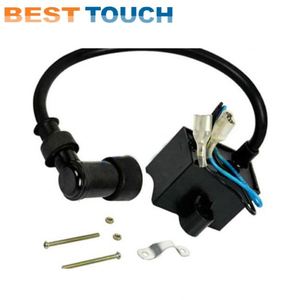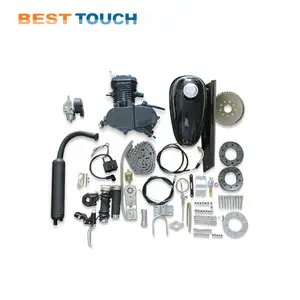(597 products available)























































































































































































There are three main types of 48cc 80cc bike engines and they include;
48cc bike engine
This engine is known for its light weight, and is popular for use in mopeds and small motorcycles. It provides a balance of fuel efficiency and performance, making it ideal for urban commuting and short-distance travel. The 48cc engine strikes a good compromise between power and efficiency, making it a popular choice for entry-level bikes and recreational vehicles.
80cc bike engine
Compared to the 48cc engine, the 80cc engine offers more power, making it suitable for slightly larger bikes and scooters. It has improved acceleration and top speed, making it ideal for longer commutes and hilly terrain. The 80cc engine is often found in a variety of applications, from delivery scooters to recreational bikes, due to its versatility and ability to handle diverse riding conditions.
Two-Stroke Engines
These are typically lighter and simpler in design, offering higher power-to-weight ratios than four-stroke engines. However, they consume more fuel and produce more emissions. They are often used in dirt bikes and some mopeds. In addition, they require mixing oil with gasoline for lubrication.
Four-Stroke Engines
These are generally more fuel-efficient and produce less emissions than two-stroke engines. They have a more complex design with greater Torque at lower RPMs. Also, they don't require oil and gas mixture. Nonetheless, they are heavier and have less power-to-weight ratio compared to two-stroke engines. Typically, they are found in street bikes and scooters with higher displacement.
Electric Bike Engines
These models come with electric motors powered by rechargeable batteries. They produce zero emissions and are generally quieter than gas-powered engines. In addition, they require less maintenance and have various levels of assistance, from low to high, depending on the model. However, their range is limited by the battery life, and they can be more expensive to purchase.
Understanding the application scenarios of bike engines 48cc and 80cc is essential for selecting the right engine for the specific needs. These engines find applications in various industries and activities where efficient and compact power is required. Here are some application scenarios:
Choosing the right bike engine is a critical decision that impacts performance, efficiency, and maintenance. Several factors should be considered when selecting between a 48cc and an 80cc engine.
First and foremost, consider the primary use of the bike. For daily commuting and city riding, a 48cc engine might be the ideal choice. Its smaller size means it’s lighter, more fuel-efficient, and generally easier to handle in stop-and-go traffic. The lower emissions are also a significant advantage in urban environments, where air quality can be a major concern. Moreover, the simplicity of the 48cc engine often translates to lower maintenance costs and fewer complications, making it an excellent choice for those who want a reliable bike without the need for high performance.
However, if the bike is intended for more demanding tasks, such as hill climbing, long-distance travel, or even light off-road riding, then an 80cc engine will be more suitable. The extra power and torque provided by the 80cc engine make a significant difference when tackling steep inclines or maintaining higher speeds on the highway. While the 80cc engine may have higher emissions and fuel consumption than its 48cc counterpart, its performance capabilities far outweigh these drawbacks for many users.
Another essential factor to consider is the weight of the bike. Generally, larger engines like the 80cc will be found in heavier bikes, which can affect handling and maneuverability. If a lighter bike with quicker acceleration is preferred, the 48cc engine would be the better choice. Conversely, if a heavier bike with more stability at higher speeds is desired, the 80cc engine would be more appropriate.
Budget is another critical consideration. While engine costs can vary, so can the overall expense related to each engine size. Generally, a 48cc engine will be less expensive regarding initial cost, maintenance, and insurance. In contrast, the 80cc engine, while more costly upfront, may offer more value in terms of performance and versatility over time.
Lastly, understanding the legal regulations in the area regarding engine size and licensing is crucial. In many places, bikes with smaller engines, like the 48cc, do not require a special license to operate, making them more accessible to a broader range of users. Larger engines may be subject to more regulations and higher insurance costs.
Many industries utilize engine bikes. Therefore, knowing their design, features, and function will help buyers choose the best engine bike for their industries. Below is the breakdown.
Q1. Is a bicycle with an engine safe?
A1. Generally, a bike with an engine is safe as long as the rider follows safety measures. Riders should always wear a helmet when riding. Also, they should be cautious when riding in traffic and obey all traffic laws. Engine bicycles are considered bicycles in most places. Therefore, they do not require special licensing or registration.
Q2. How fast can 80CC bikes go?
A2. The average speed of an 80CC bike engine is between 40-50mph. However, several factors affect its speed, such as the engine's condition, the rider's weight, and the bike's overall maintenance.
Q3. Can buyers find engines that can be installed on any bike?
A3. Yes, buyers can find engine kits that can be installed on almost any bike. However, the bikes that can be converted easily are mountain bikes and cruisers. This is because they have a larger frame that can accommodate the engine and smaller bikes parts.
Q4. What is the difference between 48CC and 80CC engine bikes?
A4. The difference between an engine bike and another is performance. An 80CC bike engine will perform better than a 48CC in terms speed and power. This is because the higher CC rating translates to more power and a faster engine. Also, an 80CC engine will consume fuel more efficiently than a 48CC engine. Nonetheless, both engines will offer similar performance levels to a non-engine bicycle, and buyers will find them in engine kits.
Q5. Can riders ride up hills with an 80CC engine bike?
A5. Yes,80CC bike engine can handle small hills. However, the engine's ability to climb a hill will depend on its power and the rider's weight. Generally,80CC bikes can handle light hills and slopes.